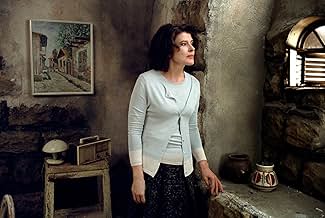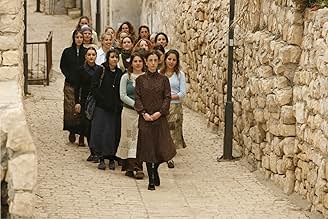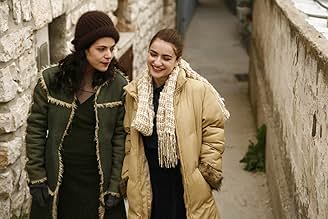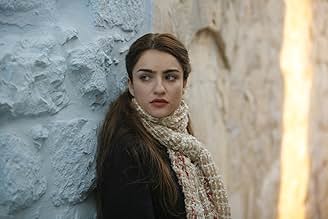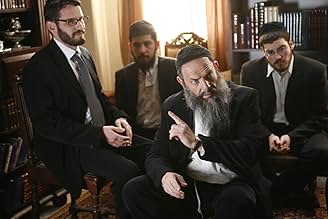VALUTAZIONE IMDb
7,0/10
2338
LA TUA VALUTAZIONE
Aggiungi una trama nella tua linguaTwo brilliant young women discover their own voices in a repressive orthodox culture where females are forbidden to sing, let alone speak out.Two brilliant young women discover their own voices in a repressive orthodox culture where females are forbidden to sing, let alone speak out.Two brilliant young women discover their own voices in a repressive orthodox culture where females are forbidden to sing, let alone speak out.
- Premi
- 1 vittoria e 10 candidature totali
Tikva Dayan
- Rabbinit
- (as Tiki Dayan)
Seffy Rivlin
- Rabbi Hess
- (as Sefi Rivlin)
Hayah Shalit
- Seminary Girl
- (as Ilayah Shalit)
Recensioni in evidenza
This is an absolutely amazing film. I have never seen an Israeli film before and didn't even know there were any. I bought the DVD because it featured Fanny Ardant and I like watching her. I don't know why Fanny Ardant is so totally fascinating, she just is. Quel surprise! Nom de Dieu! etc. I could hardly believe my eyes when the film opened with credits in Hebrew, a language in which I fear I am deficient and cannot even spell 'Moses', much less 'Ezekiel'. What unfolded before my amazed eyes was a truly wonderful film, a rich tapestry of conflicting traditions, longings, emotions, and a battle for the freedom of women from their intolerable suppression by the Ultra-Orthodox Jews and their notion of what they call 'the Law', a 2500 year-old codification of behaviour to which they appear to be utterly mentally enslaved. This portrayal of them by an Israeli filmmaker is extremely shocking. If anything is calculated to make one despise Ultra-Orthodox Judaism, this film is it, and it was made in the very country where so many of them live and where they are even represented in the Parliament. As for the story, it centres around two girls from religious families who meet as a result of having gone to study in a yeshiva (seminary), where they pore over religious texts and discuss what Deuteronomy means and such fascinating subjects as that. So restricted are these people in their thought processes that they are not even supposed to read the Talmud, but only the Torah. They are not supposed to study Kabbalah because that is heresy, and their persisting in doing so is an important part of the story. The two girls are utterly charming, played to perfection by the intense Russian-born Ania Bukstein as the character Naomi and 'Michal' (i.e., Michelle) Shtamler as the character Michelle. Their relationship begins with difficulty, because Naomi is humourless and serious, a brilliant scholar whose father is a famous rabbi, and she is engaged to the world's greatest bore, a horrid young rabbi pupil of his who is arrogant, humourless, grim, offensive in every way, and without a single redeeming quality. Michelle is a happy go lucky type with a smile that could melt the Arctic Ice Cap and the two girls are so different they have trouble hitting it off at first. Eventually, however, their friendship deepens so much that they become lovers. I can imagine the Ultra-Orthodox rioting in Jerusalem over this! It takes a very long time indeed for Naomi to lighten up, and to free herself from the brain-washing of her father and her upbringing, and to break off the engagement with the young monster rabbi. Intimately interwoven with the two girls' story is their encounter with a strange older woman in the same town, a character named Anouk, played by Fanny Ardant. Only Michelle can speak both Hebrew and French, but the two girls become drawn into the mysterious life of Anouk, who has come back to the town to die, as she has terminal cancer. Through her brilliance as a scholar Naomi finds rituals drawn from the forbidden Kabbalah to purge Anouk of her past sins, in order to ready her for death and to be 'forgiven by God'. Along the way, Naomi is shocked to discover that Anouk is not even Jewish, but her love for her past Jewish lover, whom she killed in a quarrel (she has spent 15 years in jail as a result), makes it psychologically necessary for her to go through this process. The girls risk their reputations by trying to help Anouk, and are eventually expelled from the yeshiva for heretical acts and for daring to go to Anouk's hospital bedside on the Sabbath. The film is made with such honesty and intensity, and such raw passion, that it is a searing cultural, religious, and social document as well as a human testament of immense power and relevance. All of the performances are intense and convincing. The minor character of Yanki, who should have been a rabbi but chose instead to become a musician, is charmingly portrayed by Adir Miller, who with self-deprecating smiles endears himself to everyone. The main performances by Ardant, Bukstein, and Shtamler are so radiant and compelling that this film is an instant classic. It should really be seen by anyone who likes great cinema, but even people indifferent to such things should watch it if they have the slightest interest in the Middle East, as this says so much about the melting pot which is Israel, where crazed fanatics and easygoing liberals live uneasily side by side. (Does it remind you of Beirut?) People complain about the intolerant and insane Wahabbi Muslims, but what about the Ultra-Orthodox Jews? They both suppress women, are totally humourless, and propagate grim doctrines which recommend a kind of hell on earth. Truly the extremists of the Middle East deserve each other. But do we deserve either of them? In any case, we do deserve this wonderful film, and it deserves us, in the form of our attention and admiration.
I don't have too much to add to the previous comments but I wonder why there have been no comments since last October. This movie must be hiding for the right opportunity(ies) to be seen.
I previewed this movie as part of an upcoming Jewish Film Festival and it was far and away the best drama that I have seen, perhaps in several years.
I thought the Orthodox Jewish milieu was going to be a turn-off but that only added to a great story, directing, acting, setting, and scenery.
The actresses seemed to be familiar types from other, English-language, films but they probably were not. Just a very good experience.
I previewed this movie as part of an upcoming Jewish Film Festival and it was far and away the best drama that I have seen, perhaps in several years.
I thought the Orthodox Jewish milieu was going to be a turn-off but that only added to a great story, directing, acting, setting, and scenery.
The actresses seemed to be familiar types from other, English-language, films but they probably were not. Just a very good experience.
Living in a secular society and not being religious myself this movie was like visiting another planet. It's a world where religion is taken seriously. And when I say religion I don't mean believing in God (or G-d, as in the sub-titles), but rather the understanding of what God said is studied seriously. Again, while I'm not religious, I admired the fact that the girls took it so gravely seriously. I admit I cannot make a judgment on the accuracy of the movie as a depiction of Orthodox Jews, but the world is filled with societies where women are treated as less then men so it wouldn't surprise me if it was true. As a movie, it was funny and dramatic and entertaining and never lost my interest for a moment. I saw this at the Toronto International Film Festival 2007, but I hope this gets some North American release.
Ha-Sodot (2007), is an Israeli film, shown in the U.S. as "The Secrets." It was co-written and directed by Avi Nesher. Noemi (Ania Bukstein) is a young woman who loves to study Torah with her father. She knows that, as a ultra-orthodox Jew, she can never be a rabbi, and she accepts that fact. However, she cannot accept the traditional role of wife and mother that's expected of her by her culture. She's given permission to study at a women's seminary. The school is operated by an older woman who is trying to bring learning to Orthodox women, while working within the Orthodox culture.
It's a good school, where the students are treated well and where learning and good works are emphasized. The plot revolves around one type of good works--bringing food to people in the area who cannot afford to purchase what they need. The person to whom the food is brought is a woman named Anouk, played by Fanny Ardant. Noemi is chosen to take the food because she's extremely competent, and Anouk's situation is complex and difficult. Anouk's first language is French, so the Headmistress assigns Michal, a French-speaking student, to accompany Noemi.
One of the major plot threads revolves around the relationship of the two young women with the older woman. Another plot thread is the growing tenderness between Noemi and Michal. A third thread is the difficulties for women who want to exercise their judgment in a society where the judgments are traditionally made by men.
We saw two movies at the Rochester Jewish Film Festival. The first was "Noodle." When I reviewed that film I noted that it could have been made in any developed nation--not just Israel. "The Secrets" could probably only be made in Israel. Obviously, patriarchal societies exist in many countries. However, I think that only in Israel could a film be made about people who live within such a society, and yet be shown in theaters with scenes that include full frontal nudity. That is the paradox of Israeli society--the ancient and orthodox exist in parallel with the modern and liberated.
The acting in the film was outstanding. Both Bukstein and Shtamler are extraordinarily attractive and capable actors. However, when Fanny Ardant is on the screen, her beauty and acting skill make you forget everyone else.
"The Secrets" is an unusual and compelling film. If the movie is released for theatrical distribution, watch for it and see it. Otherwise, try to find it on DVD. This is a fascinating film--don't miss it!
It's a good school, where the students are treated well and where learning and good works are emphasized. The plot revolves around one type of good works--bringing food to people in the area who cannot afford to purchase what they need. The person to whom the food is brought is a woman named Anouk, played by Fanny Ardant. Noemi is chosen to take the food because she's extremely competent, and Anouk's situation is complex and difficult. Anouk's first language is French, so the Headmistress assigns Michal, a French-speaking student, to accompany Noemi.
One of the major plot threads revolves around the relationship of the two young women with the older woman. Another plot thread is the growing tenderness between Noemi and Michal. A third thread is the difficulties for women who want to exercise their judgment in a society where the judgments are traditionally made by men.
We saw two movies at the Rochester Jewish Film Festival. The first was "Noodle." When I reviewed that film I noted that it could have been made in any developed nation--not just Israel. "The Secrets" could probably only be made in Israel. Obviously, patriarchal societies exist in many countries. However, I think that only in Israel could a film be made about people who live within such a society, and yet be shown in theaters with scenes that include full frontal nudity. That is the paradox of Israeli society--the ancient and orthodox exist in parallel with the modern and liberated.
The acting in the film was outstanding. Both Bukstein and Shtamler are extraordinarily attractive and capable actors. However, when Fanny Ardant is on the screen, her beauty and acting skill make you forget everyone else.
"The Secrets" is an unusual and compelling film. If the movie is released for theatrical distribution, watch for it and see it. Otherwise, try to find it on DVD. This is a fascinating film--don't miss it!
I saw this film tonight and was utterly blown away...It seems that the quality of Israeli films has drastically increased in recently years, but this film in particular hits all the right notes of comedy and tragedy that truly inspire.
The plot is multifaceted and contains multiple layers and questions. Indeed, it is far more ambitious in the tale it weaves than most.
A lesser film would settle for the storyline of the uptight girl taught a life lesson as she helps an elder, or the uptight girl falling in love and learning to live life not by the rules, or else maybe tentatively learn to question her religious upbringing, but this film manages to weave all of these elements together and truly make them sing.
The characters are without exception well fleshed out and wonderful. They all feel like real human beings rather than caricatures. In particular, the main love story is poignant and well fleshed out. The tragedy of forbidden desire is truly a tangible ingredient in the film's brew.
One of my favorite things about non-American cinema in general, but especially Israeli film, in fact, is the way they show love and the human body in a beautiful and sensual fashion without over dramatizing or being untrue. Last years Haboah ("The Bubble") did this exceptionally well, as does this film...
This was a truly powerful film that challenged notions of religious authority and hierarchy will simultaneously treating them with the utmost respect and a mysterious power. Absolutely worth seeking out and seeing.
The plot is multifaceted and contains multiple layers and questions. Indeed, it is far more ambitious in the tale it weaves than most.
A lesser film would settle for the storyline of the uptight girl taught a life lesson as she helps an elder, or the uptight girl falling in love and learning to live life not by the rules, or else maybe tentatively learn to question her religious upbringing, but this film manages to weave all of these elements together and truly make them sing.
The characters are without exception well fleshed out and wonderful. They all feel like real human beings rather than caricatures. In particular, the main love story is poignant and well fleshed out. The tragedy of forbidden desire is truly a tangible ingredient in the film's brew.
One of my favorite things about non-American cinema in general, but especially Israeli film, in fact, is the way they show love and the human body in a beautiful and sensual fashion without over dramatizing or being untrue. Last years Haboah ("The Bubble") did this exceptionally well, as does this film...
This was a truly powerful film that challenged notions of religious authority and hierarchy will simultaneously treating them with the utmost respect and a mysterious power. Absolutely worth seeking out and seeing.
Lo sapevi?
- ConnessioniFeatured in Sharon Amrani: Remember His Name (2010)
I più visti
Accedi per valutare e creare un elenco di titoli salvati per ottenere consigli personalizzati
- How long is The Secrets?Powered by Alexa
Dettagli
- Data di uscita
- Paesi di origine
- Sito ufficiale
- Lingue
- Celebre anche come
- Sırlar
- Luoghi delle riprese
- Aziende produttrici
- Vedi altri crediti dell’azienda su IMDbPro
Botteghino
- Lordo Stati Uniti e Canada
- 122.094 USD
- Fine settimana di apertura Stati Uniti e Canada
- 19.536 USD
- 30 nov 2008
- Lordo in tutto il mondo
- 264.006 USD
Contribuisci a questa pagina
Suggerisci una modifica o aggiungi i contenuti mancanti



